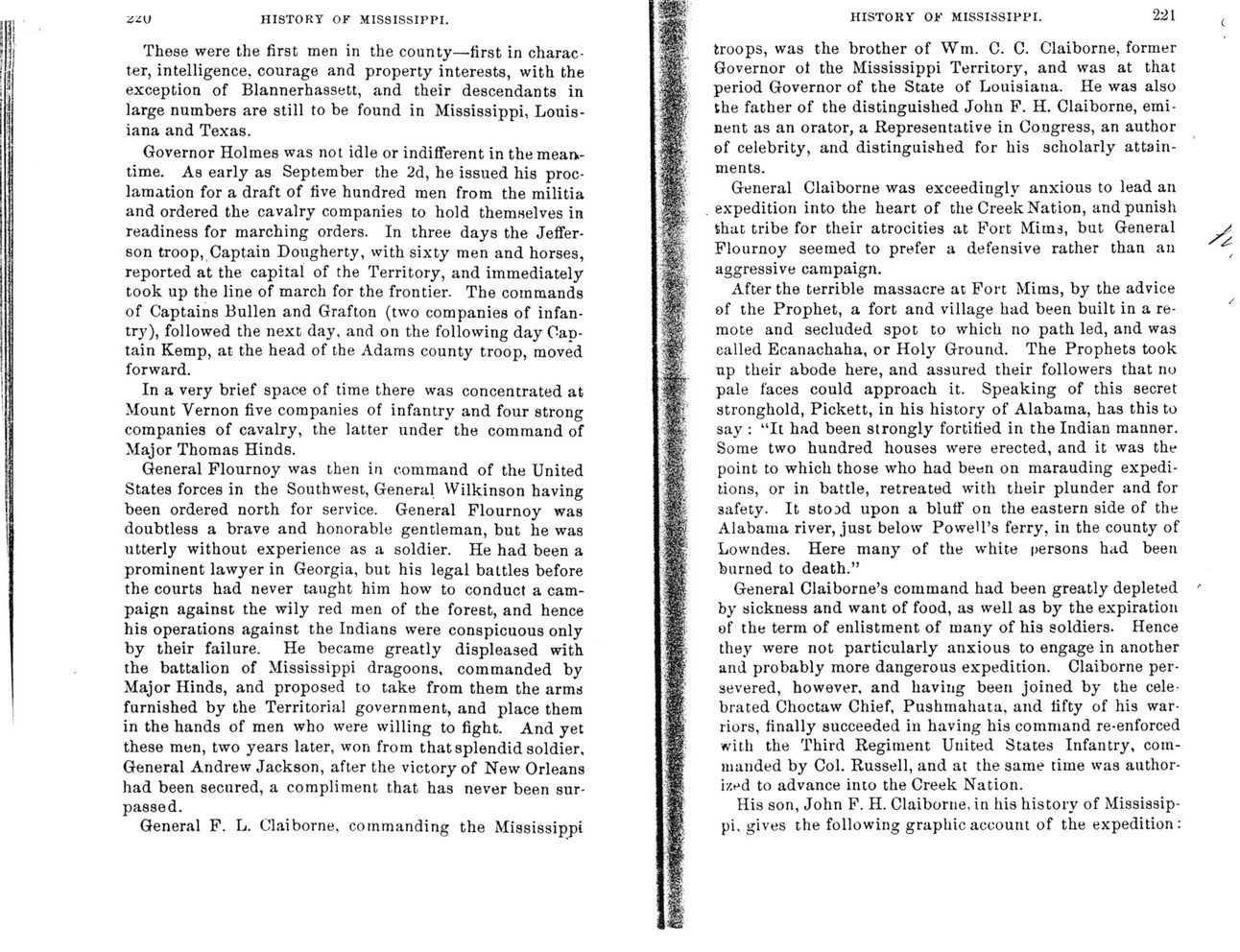This text was obtained via automated optical character recognition.
It has not been edited and may therefore contain several errors.
zzv HISTORY OK MISSISSIPPI. These were the first men in the county?first in character, intelligence, courage and property interests, with the exception of Blannerhassett, and their descendants in large numbers are still to be found in Mississippi, Louisiana and Texas. Governor Holmes was not idle or indifferent in the meantime. As early as September the 2d, he issued his proclamation for a draft of five hundred men from the militia and ordered the cavalry companies to hold themselves in readiness for marching orders. In three days the Jefferson troop, Captain Dougherty, with sixty men and horses, reported at the capital of the Territory, and immediately took up the line of march for the frontier. The commands of Captains Bullen and Grafton (two companies of infantry), followed the next day, and on the following day Captain Kemp, at the head of the Adams county troop, moved forward. In a very brief space of time there was concentrated at Mount Vernon five companies of infantry and four strong companies of cavalry, the latter under the command of Major Thomas Hinds. General Flournoy was then in command of the United States forces in the Southwest, General Wilkinson having been ordered north for service. General Flournoy was doubtless a brave and honorable gentleman, but he was utterly without experience as a soldier. He had been a prominent lawyer in Georgia, but his legal battles before the courts had never taught him how to conduct a campaign against the wily red men of the forest, and hence his operations against the Indians were conspicuous only by their failure. He became greatly displeased with the battalion of Mississippi dragoons, commanded by Major Hinds, and proposed to take from them the arms furnished by the Territorial government, and place them in the hands of men who were willing to fight. And yet these men, two years later, won from that splendid soldier. General Andrew Jackson, after the victory of New Orleans had been secured, a compliment that has never been surpassed. General F. L. Claiborne, commanding the Mississippi HISTORY OK MISSISSIPPI. 221 troops, was the brother of Wm. C. C. Claiborne, former Governor ot the Mississippi Territory, and was at that period Governor of the State of Louisiana. He was also the father of the distinguished John F. H. Claiborne, eminent as an orator, a Representative in Congress, an author of celebrity, and distinguished for his scholarly attainments. General Claiborne was exceedingly anxious to lead an expedition into the heart of the Creek Nation, and punish that tribe for their atrocities at Fort Mims, but General Flournoy seemed to prefer a defensive rather than an aggressive campaign. After the terrible massacre at Fort Mims, by the advice of the Prophet, a fort and village had been built in a remote and secluded spot to which no path led, and was called Ecanachaha, or Holy Ground. The Prophets took up their abode here, and assured their followers that no pale faces could approach it. Speaking of this secret stronghold, Pickett, in his history of Alabama, has this to say : ?It had been strongly fortified in the Indian manner. Some two hundred houses were erected, and it was the point to which those who had been on marauding expeditions, or in battle, retreated with their plunder and for safety. It stood upon a bluff on the eastern side of the Alabama river, just below Powell?s ferry, in the county of Lowndes. Here many of the white persons had been burned to death.? General Claiborne?s command had been greatly depleted by sickness and want of food, as well as by the expiration of the term of enlistment of many of his soldiers. Hence they were not particularly anxious to engage in another and probably more dangerous expedition. Claiborne persevered, however, and having been joined by the celebrated Choctaw Chief, Pushmahata, and fifty of his warriors, finally succeeded in having his command re-enforced with the Third Regiment United States Infantry, commanded by Col. Russell, and at the same time was authorized to advance into the Creek Nation. His son, John F. H. Claiborne, in his history of Mississippi, gives the following graphic account of the expedition:

Claiborne, J.F.H Claiborne-J.F.H-039